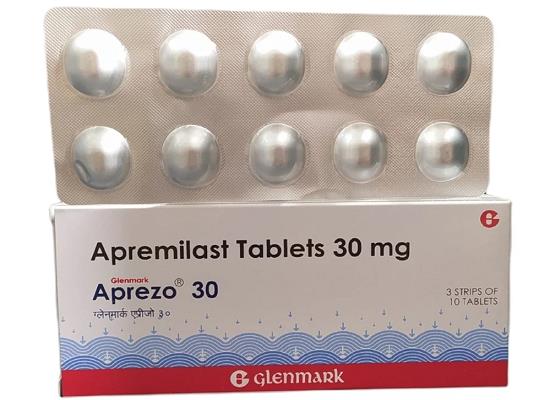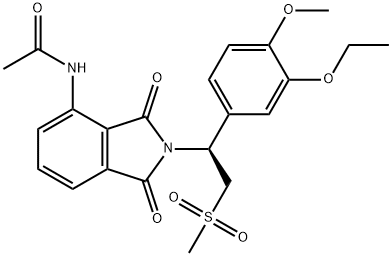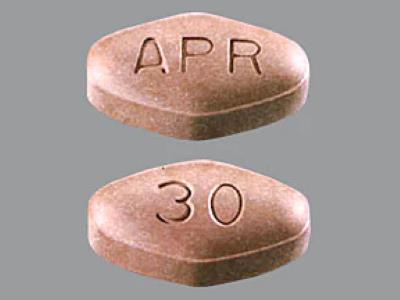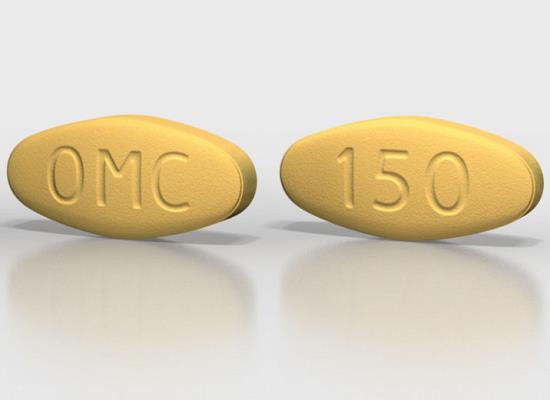Apremilast Uses and Relevance to the Military
General Description
Apremilast is an effective medication for treating psoriasis and psoriatic arthritis, with clinical trials and real-world data showing significant symptom reduction. While plaque clearance may be slower compared to other treatments, it has shown efficacy in both treatment-naive and non-treatment-naive patients with psoriatic arthritis. Apremilast offers advantages for military personnel and individuals in austere conditions, with low toxicity, simple storage requirements, minimal monitoring, and reduced risk of exposure to pathogens. Common adverse effects include weight loss, diarrhea, nausea, headache, and upper respiratory tract infection, but these are typically manageable and do not outweigh the benefits of the medication.

Figure 1. Tablets of apremilast
Apremilast in Psoriasis and Psoriatic Arthritis
Apremilast is a safe and effective medication for treating psoriasis and psoriatic arthritis. Clinical trials have shown that it significantly reduces psoriasis symptoms, with 33.1% of patients experiencing a 75% or greater reduction in PASI score. Real-world data suggests even better results, with 48.6% of patients achieving PASI-75 after 6 months of treatment. However, plaque clearance may be slower compared to other treatments. In terms of cost-effectiveness, apremilast has a higher cost per level of PASI compared to biologics and methotrexate. In the case of psoriatic arthritis, apremilast has been evaluated in clinical trials and found effective in both treatment-naïve and non-treatment-naïve patients. It provides a 20% disease improvement in 40% of patients, similar to methotrexate but less effective than adalimumab. Nevertheless, apremilast's higher price should be considered. Overall, apremilast proves efficacy in treating psoriasis and psoriatic arthritis, although other medications may provide better plaque clearance. The choice should consider the cost-effectiveness of different treatment options. 1
Use in the Military and Beyond
Psoriasis and other inflammatory skin conditions can have a significant impact on military personnel, affecting their ability to fulfill their duties and remain ready for deployment. While a history of psoriasis can disqualify recruits from service, many active-duty members require treatment due to various reasons. Apremilast has been used during deployment and has shown effectiveness in treating psoriasis and psoriatic arthritis, allowing most service members to maintain their deployable status even after a year. The drug offers advantages for the military population, including low toxicity, simple storage requirements, minimal monitoring, and reduced risk of exposure to various pathogens. Unlike other treatments that require refrigeration, apremilast is suitable for austere overseas settings. Additionally, its use reduces the need for frequent laboratory monitoring and office visits, which can hinder a service member's ability to perform their duties effectively. Moreover, apremilast's benefits extend beyond the military, making it an appealing choice for individuals working in austere conditions or engaging in extensive worldwide travel, such as government contractors, firefighters, foreign-aid workers, and diplomats. Overall, apremilast's ease of use, storage requirements, simplified monitoring, and reduced immunosuppressive risks make it a valuable treatment option for military personnel and other populations in similar circumstances where standard care drugs may not be practical or feasible. 2
Common Adverse Effects
Common adverse effects of apremilast include weight loss, diarrhea, nausea, headache, and upper respiratory tract infection. In clinical trials, weight loss was observed in a percentage of patients, with more significant weight loss in a small portion of patients. Specifically, weight loss greater than 5% of total body weight was seen in 5% of patients, 5%-10% of total body weight in 10%-12% of patients, and more than 10% of total body weight in 2% of patients. Gastrointestinal AEs, such as diarrhea and nausea, are often self-limited and tend to improve or resolve after the first few weeks of therapy. It is important to exercise caution in patients older than 65 years and those at risk for hypotension or volume depletion. While rare, depressed mood is listed as a potential AE, occurring in less than 1% of patients. Therefore, apremilast should be used cautiously in patients with a history of depression or suicidal ideation. It is worth noting that weight loss is generally self-limited, but routine monitoring of weight is recommended to ensure the well-being of patients. Overall, while apremilast may cause certain adverse effects, they are typically manageable and do not outweigh the potential benefits of the medication. 2
Reference
1. Sandhu VK, Eder L, Yeung J. Apremilast and its role in psoriatic arthritis. G Ital Dermatol Venereol. 2020;155(4):386-399.
2. Hathaway NE, Lyford WH. Apremilast Uses and Relevance to the Military. Cutis. 2021;107(4):216-220.
Related articles And Qustion
Lastest Price from Apremilast manufacturers

US $0.00/kg2025-11-28
- CAS:
- 608141-41-9
- Min. Order:
- 1kg
- Purity:
- 98%
- Supply Ability:
- Customise

US $0.00/Kg/Bag2025-04-21
- CAS:
- 608141-41-9
- Min. Order:
- 10g
- Purity:
- 99.5%min
- Supply Ability:
- 5000g



